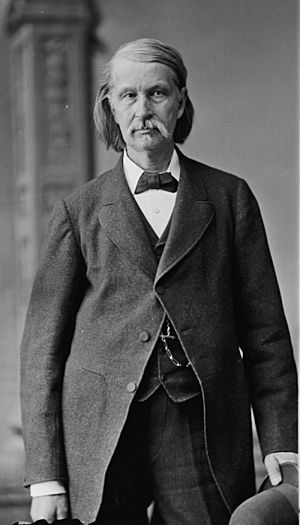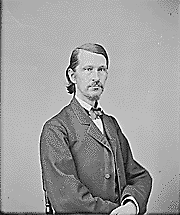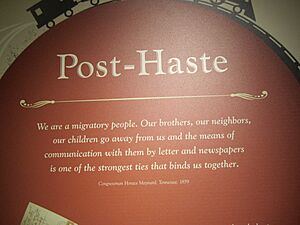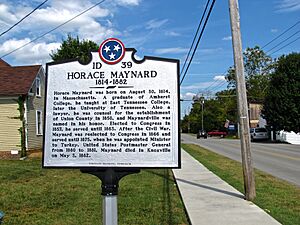Horace Maynard facts for kids
Quick facts for kids
Horace Maynard
|
|
|---|---|
 |
|
| 28th United States Postmaster General | |
| In office June 2, 1880 – March 4, 1881 |
|
| President | Rutherford B. Hayes |
| Preceded by | David M. Key |
| Succeeded by | Thomas James |
| United States Minister to the Ottoman Empire | |
| In office June 12, 1875 – July 15, 1880 |
|
| President | Ulysses S. Grant Rutherford B. Hayes |
| Preceded by | George Boker |
| Succeeded by | James Longstreet |
| Chairman of the House Republican Conference | |
| In office March 4, 1873 – March 3, 1875 |
|
| Speaker | James G. Blaine |
| Preceded by | Austin Blair |
| Succeeded by | George W. McCrary |
| Member of the U.S. House of Representatives from Tennessee |
|
| In office July 24, 1866 – March 3, 1875 |
|
| Preceded by | Self (1863) |
| Succeeded by | Jacob M. Thornburgh (2nd) |
| Constituency | 2nd district (1866–1873) At-large district (1873–1875) |
| In office March 4, 1857 – March 3, 1863 |
|
| Preceded by | William H. Sneed (6th) |
| Succeeded by | Self (1866) |
| Constituency | 2nd district |
| Personal details | |
| Born | August 30, 1814 Westborough, Massachusetts, U.S. |
| Died | May 3, 1882 (aged 67) Knoxville, Tennessee, U.S. |
| Resting place | Old Gray Cemetery |
| Political party | Whig (Until 1856) American (1856–1858) Opposition (1858–1860) Unionist (1861–1866) Unconditional Union (1866–1867) Republican (1867–1882) |
| Spouse | Laura Washburn |
| Education | Amherst College (BA) |
| Signature | |
Horace Maynard (born August 30, 1814 – died May 3, 1882) was an important American leader in the 1800s. He was a teacher, a lawyer, a politician, and a diplomat.
He was first elected to the House of Representatives from Tennessee in 1857. Maynard strongly supported the Union during the Civil War. He also believed in ending slavery. He was one of the few Southern congressmen who kept his seat during the war.
After the war, Maynard served as Tennessee's attorney general. He later became an ambassador to the Ottoman Empire (modern-day Turkey). Finally, he served as the United States Postmaster General, in charge of the country's mail system.
Maynard left teaching in the 1840s to become a lawyer. He was known for his sharp mind and direct way of speaking. In Congress, he worked hard to keep the country united. During the Civil War, he often asked President Abraham Lincoln to send Union troops to free East Tennessee from Confederate control.
Contents
Biography of Horace Maynard
Early Life and Education
Horace Maynard was born in Westborough, Massachusetts. He went to Millbury Academy and then Amherst College. At Amherst, he put a "V" above his door. This mystery was solved in 1838 when he was named the valedictorian of his class. This means he was the top student.
In 1839, he moved to Knoxville, Tennessee. He became a professor at East Tennessee College, which is now the University of Tennessee. He first taught high school students. By 1841, he was teaching college-level math and ancient languages.
Maynard didn't like Knoxville at first. He thought it was old-fashioned and wanted to leave. But after he became a lawyer in 1844, he enjoyed working in the local courts. He decided to stay in Knoxville. A lawyer named Oliver Perry Temple said Maynard could be "abrupt and often offensive." But people still respected him.
Starting in Congress
Maynard first ran for Congress in 1852. He faced many attacks in newspapers and lost the election. In 1856, with support from a local newspaper, he won the congressional seat for Tennessee's 2nd District. He easily won reelection in 1858.
Maynard started his political career with the Whig Party. He helped choose the president in 1852 as an elector. After the Whig Party broke apart, he ran for Congress with other parties. These included the American, Opposition, and Unionist parties.
Views on Slavery and the Secession Crisis
Maynard's ideas about slavery changed over time. This was common for people in East Tennessee who supported the Union. In the 1830s, Maynard, whose father was against slavery, called it "a curse."
By 1850, he wrote to his father defending slavery. He said there was a "bright as well as a dark side to slavery." In 1860, he owned four slaves. Even though he was against states leaving the Union, he still defended slavery. But near the end of the Civil War, he changed his mind again. He then supported President Lincoln's Emancipation Proclamation, which freed slaves.
Maynard worked hard to keep Tennessee in the Union. He worked with other Union supporters like Andrew Johnson and William G. Brownlow. In 1860 and 1861, he gave many speeches across East Tennessee. He urged people to stay loyal to the United States. He also helped lead a meeting that wanted to create a separate Union-supporting state in East Tennessee.
During the Civil War

After the meeting in June 1861, Maynard went to Washington, D.C. to serve in Congress. When Confederate forces took over East Tennessee, Maynard constantly asked President Lincoln for help. He warned that the suffering of East Tennesseans would be a "blot" on Lincoln's government.
In December 1861, Maynard criticized General George H. Thomas. Thomas had hesitated to invade the region after some bridges were burned by Union supporters. Maynard called his actions "disgraceful." Union troops finally entered Knoxville in September 1863.
When Maynard returned to Knoxville, Union supporters were divided. Some, like Maynard, supported the Emancipation Proclamation. Others wanted things to go back to how they were before the war. In 1864, Andrew Johnson, who was then Tennessee's military governor, made Maynard the state's attorney general.
After the War

Maynard was elected to Congress again in 1866. He served as a Republican for several more terms. During one term, he led the House Committee on Banking and Currency. This committee deals with money and banks.
In 1868, while still in Congress, Maynard was also appointed to the Tennessee Supreme Court. He held both jobs at the same time for a short period. His right to do this was questioned, but his actions as a judge were considered valid.
In 1873, Maynard won a big election for Congress. He defeated both former President Andrew Johnson and a popular politician named Benjamin F. Cheatham. The next year, he ran for Governor of Tennessee but lost.
From 1875 to 1880, he served as the U.S. Minister (like an ambassador) to Turkey. Then, from 1880 to 1881, he was the United States Postmaster General under President Rutherford B. Hayes. This meant he was in charge of the entire postal service.
Horace Maynard died suddenly in Knoxville in 1882 from heart disease. He was buried in Old Gray Cemetery in Knoxville.
Horace Maynard's Legacy

People remembered Maynard for his strong intelligence and ability to convince others. A newspaper editor called him the "best read man" among lawyers. The famous abolitionist Frederick Douglass said Maynard had a "three story head," meaning he was very smart. Even a political opponent, Peter Staub, said he voted for Maynard twice because he was so impressed by his arguments.
In the 1850s, a new county called Union County, Tennessee was formed. Another county tried to sue to stop it from existing. Maynard successfully defended Union County. Because of this, the county named its main town, Maynardville, in his honor. Horace Maynard High School served the county for many years.
Maynard's son, Washburn, commanded the USS Nashville during the Spanish–American War. His ship fired the first American shot of that war. Another son, James, was president of a large textile company in Knoxville.
 | Ernest Everett Just |
 | Mary Jackson |
 | Emmett Chappelle |
 | Marie Maynard Daly |

